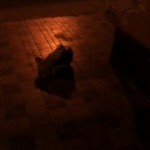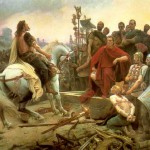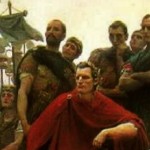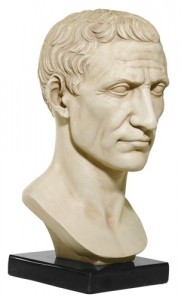Thanks to Wode Toad for his help with the classical  history & the Latin. This is one of those times when his work in the classical department at St Andrews comes in handy.
history & the Latin. This is one of those times when his work in the classical department at St Andrews comes in handy.
He seems to be restless and pre-occupied, though, of late, and talks of travelling).
In the winter of 49 BC, the Roman General Gaius Julius Caesar had decisions to make. He was camped on the edge of the icy Alps, looking south, across the river.
He had established a strong political base in Rome, then had become governor of the  various Roman provinces bordering the tribes in Gaul. The Gauls were the various Celtic Tribes who lived in what is now France, as well as parts of Switzerland and Germany (the Gauls in Galatia–in the Balkans–had been subdued by the Romans earlier). He countered a move by one tribe–the Helvetii–and through a series of quick and effective military maneuvers established control over all of Gaul (Omnia Gallia). The crown of this military campaign was the surrender of the Chieftain Vercingetorix on October 3rd in 51 BC.
various Roman provinces bordering the tribes in Gaul. The Gauls were the various Celtic Tribes who lived in what is now France, as well as parts of Switzerland and Germany (the Gauls in Galatia–in the Balkans–had been subdued by the Romans earlier). He countered a move by one tribe–the Helvetii–and through a series of quick and effective military maneuvers established control over all of Gaul (Omnia Gallia). The crown of this military campaign was the surrender of the Chieftain Vercingetorix on October 3rd in 51 BC.
Caesar, aware of the importance of media, wrote dispatches back to Rome detailing his campaign and his soldiers’ achievements. The work is in a simple and clear Latin prose, yet reads well–Gaius Julius Caesar is a vivid Storyteller, and his History of the Gallic Wars was popular at the time and made him a popular hero (It is still read; Wode remembers scrumping his uncle’s copy as a tad and following the military campaigns). As an encore, Caesar invaded Britain.
clear Latin prose, yet reads well–Gaius Julius Caesar is a vivid Storyteller, and his History of the Gallic Wars was popular at the time and made him a popular hero (It is still read; Wode remembers scrumping his uncle’s copy as a tad and following the military campaigns). As an encore, Caesar invaded Britain.
However, back in the senate–the body that ruled the Roman Republic–Caesar’s political power had begun to erode. Although Caesar had power (and troops) on the frontier in Gaul, Rome was controlled by supporters of his main rival–Pompey (Gnaeus Pompeius Magnus).
Julius Caesar was commanded by the Roman Senate to vacate his post and return to Rome.
The rule was that general could only lead troops–or even carry his own weapons–outside of the boundaries of the state of Rome itself, the northern boundary of which was the Rubicon river. To come armed beyond this point was an act of treason against the Republic of Rome, and a capital offense.
However, approaching Rome unarmed and alone left Caesar at the mercy of his accusers.
As the Roman historian Plutarch puts it:
“ When he came to the river Rubicon, which parts Gaul within the Alps from the rest of Italy, his thoughts began to work, now he was just entering upon the danger, and he wavered much in his mind, when he considered the greatness of the enterprise into which he was throwing himself. He checked his course, and ordered a halt, while he revolved with himself, and often changed his opinion one way and the other, without speaking a word. This was when his purposes fluctuated most; presently he also discussed the matter with his friends who were about him, (of which number Asinius Pollio was one,) computing how many calamities his passing that river would bring upon mankind, and what a relation of it would be transmitted to posterity.”
When he came to the river Rubicon, which parts Gaul within the Alps from the rest of Italy, his thoughts began to work, now he was just entering upon the danger, and he wavered much in his mind, when he considered the greatness of the enterprise into which he was throwing himself. He checked his course, and ordered a halt, while he revolved with himself, and often changed his opinion one way and the other, without speaking a word. This was when his purposes fluctuated most; presently he also discussed the matter with his friends who were about him, (of which number Asinius Pollio was one,) computing how many calamities his passing that river would bring upon mankind, and what a relation of it would be transmitted to posterity.”
So there he is.
At the edge of a river, just out of the Alps, in the ice of January, he is hesitating. 400 horsemen and 5000 legionnaires are waiting for his choice, all of Rome is waiting for his choice. A life of forced retirement is facing him if he goes on unarmed, and either death and humiliation or survival rises before him if he takes his army across the river.
He waits, wavering, hesitating, shivering, trying to decide.
Suddenly, he makes up his mind.
He stands up.
He looks south, across the river, and says:
“alea iacta est“–“the die is cast.”
He leads his troops across the river, into Rome, and into history.
Decisions are unavoidable.
Usually, the choices are all a mixed bag, but to not make them is the worst of all.
Julius Caesar was victorious, but his victory would lead to his death 2 years later (and the end of the Republic). To decide is to cast the dice irrevocably, to take a step into the icy waters of the Rubicon.
To live heroically is to accept the responsibility, to embrace the possibility of defeat, but to march on.

